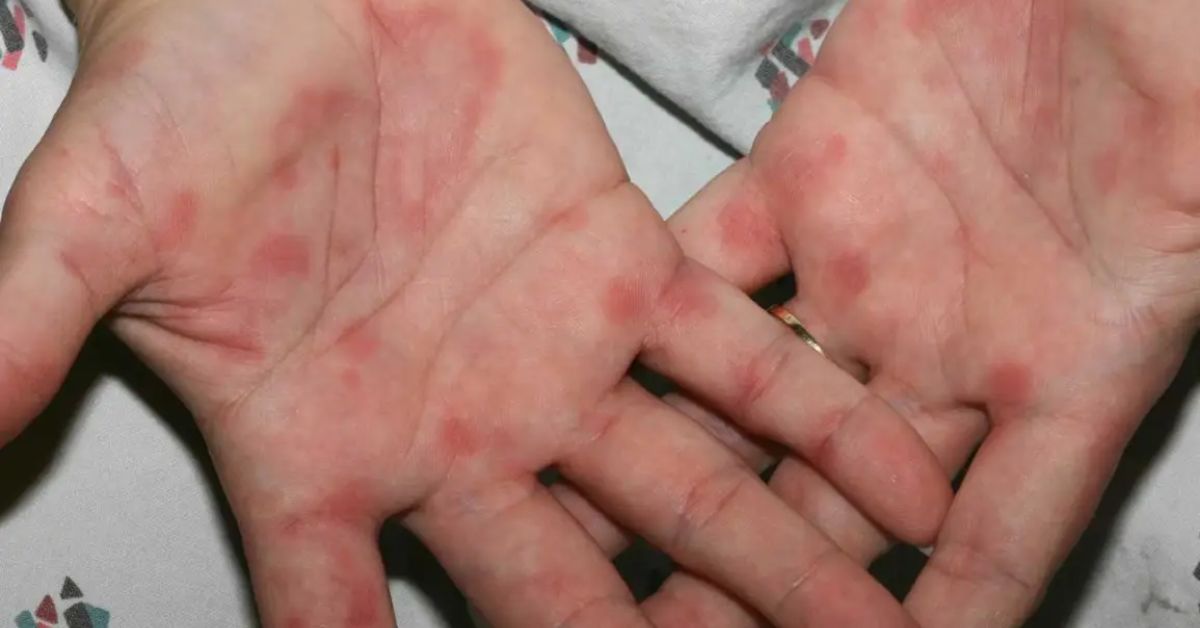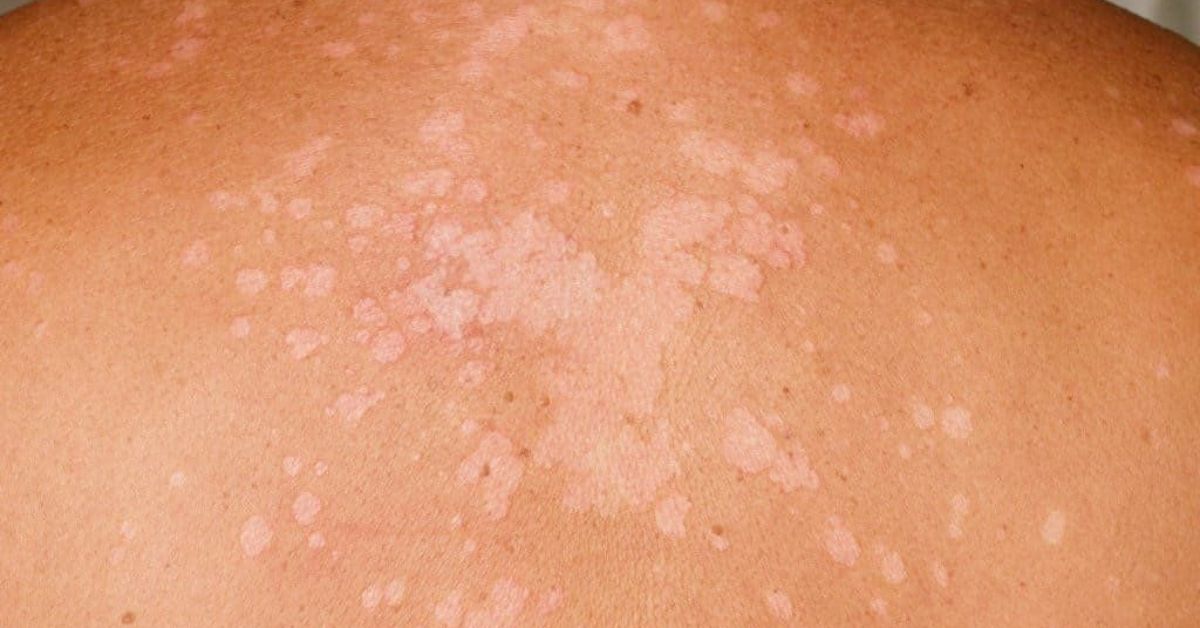Systemic lupus erythematosus (SLE), or simply lupus, is a chronic autoimmune disease that can affect multiple organs in the body. In the early stages, symptoms of Early Stage Discoid Lupus Erythematosus are often atypical, making diagnosis challenging. However, detecting and treating the disease early can help control it and prevent dangerous complications.
Common Symptoms of Early Stage Discoid Lupus Erythematosus
Patients with “early-stage systemic lupus erythematosus” may experience the following symptoms:
- Prolonged fatigue: Fatigue is one of the earliest and most common symptoms of lupus (early lupus symptoms), significantly impacting quality of life.
- Mild fever: Not all patients have a fever, but mild fever can be an initial sign of the disease.

“early stage lupus erythematosus” with mild fever
- Joint pain: Systemic lupus erythematosus can cause pain, swelling, and stiffness in the joints, especially in the small joints of the hands and feet.
- Butterfly rash: A butterfly-shaped rash on the face, spanning across the nose and cheeks, is a prominent feature of lupus (early detection of lupus erythematosus).

“Early Stage Discoid Lupus Erythematosus” – Butterfly rash
- Hair loss: Patchy hair loss or thinning hair. Mouth ulcers: Shallow sores appearing in the mouth or nose. Diagnosis of Early-Stage Systemic Lupus Erythematosus
There is no single test to confirm systemic lupus erythematosus. To diagnose “early-stage systemic lupus erythematosus,” doctors rely on a combination of clinical symptoms and test results:
Blood tests: Positive antinuclear antibodies (ANA) are found in most lupus patients (lupus erythematosus testing). Levels of complement proteins also help assess disease activity.
Tests of other organs: Skin biopsy, urine analysis, X-rays, echocardiograms, etc., help identify organ damage caused by lupus.
Treatment of Early-Stage Systemic Lupus Erythematosus
The treatment goal for “early-stage systemic lupus erythematosus” is to reduce symptoms, prevent flare-ups, and limit organ damage.
Medications:
Nonsteroidal anti-inflammatory drugs (NSAIDs) help relieve pain and joint inflammation.
Antimalarial drugs may improve rashes, joint pain, and fatigue.

Diagnosis of “Early Stage Discoid Lupus Erythematosus” through blood test
Low to moderate doses of corticosteroids control more severe cases.
Immunosuppressive drugs are used in severe cases.
Lifestyle changes:
Protecting the skin from sunlight (preventing lupus erythematosus). Getting adequate rest when feeling fatigued. Maintaining a balanced diet. Regular exercise. Immune System and Systemic Lupus Erythematosus
Systemic lupus erythematosus is an autoimmune disease. This means the body’s immune system mistakenly attacks healthy tissues as harmful and targets them. This attack causes inflammation and widespread tissue damage.
Causes and Risk Factors of Systemic Lupus Erythematosus
The exact cause of lupus is still unknown. However, the following factors are believed to increase the risk of developing the disease:
Genetics: People with a family history of lupus are at higher risk. Environment: Exposure to sunlight, certain medications, viral infections can trigger lupus in predisposed individuals. Hormones: Lupus is more common in women of childbearing age. Living with Systemic Lupus Erythematosus
Systemic lupus erythematosus is a chronic disease. However, with modern medicine, most lupus patients can live healthy, active lives. Adhering to treatment, adopting healthy habits, and receiving emotional support can improve quality of life.
Some questions related to “Early Stage Discoid Lupus Erythematosus”
Here are 5 questions related to “Early Stage Discoid Lupus Erythematosus”
Could prolonged fatigue, joint pain be signs of early stage discoid lupus erythematosus?
Answer:
Prolonged fatigue and joint pain are indeed common symptoms of early stage discoid lupus erythematosus. However, these can also be signs of many other conditions. Therefore, if you experience these symptoms, it is best to see a doctor for an accurate diagnosis.
In addition to fatigue and joint pain, other symptoms of early stage discoid lupus erythematosus may include:
Mild fever Butterfly-shaped rash on the face Hair loss Mouth sores Chest pain Dry eyes
What tests are done to diagnose early stage discoid lupus erythematosus?
Answer:
There are several different tests that may be used to diagnose early stage discoid lupus erythematosus, including:
Blood tests: A positive antinuclear antibody (ANA) test is a common indicator of lupus. However, ANA tests can also be positive in people who do not have lupus. Other tests such as complete blood count, kidney function tests, liver function tests, etc., may also be performed to assess the disease activity and potential complications. Imaging tests: X-rays, MRI scans, ultrasound, etc., may help detect damage to organs such as joints, kidneys, heart, etc., caused by lupus. Doctors will rely on a combination of clinical symptoms and test results to diagnose early stage discoid lupus erythematosus.
Can early stage discoid lupus erythematosus be cured?
Answer:
Currently, there is no method that can completely cure discoid lupus erythematosus. However, with modern medicine, most lupus patients can live healthy, active lives and effectively manage symptoms.
Treatment of early stage discoid lupus erythematosus focuses on:
Reducing symptoms: Pain relievers, anti-inflammatory drugs (NSAIDs) Antimalarial drugs Corticosteroids Immune-suppressing drugs Preventing flare-ups: Lifestyle changes Using sunscreen Proper rest Balanced diet Limiting organ damage: Monitoring and treating complications Regular health check-ups
I have early stage discoid lupus erythematosus, how can I control the disease?
Answer:
In addition to following your doctor’s treatment plan, you can also take some measures to control early stage discoid lupus erythematosus and improve your quality of life:
Protect your skin from sunlight: Use broad-spectrum sunscreen with SPF 30 or higher, wear protective clothing when going outside. Get proper rest: Get enough sleep and take time to relax to allow your body to recover. Balanced diet: Incorporate plenty of fruits, vegetables, whole grains, and lean protein into your diet. Limit processed foods, spicy foods, and oily foods. Regular exercise: Engage in gentle, appropriate exercise to boost immunity and improve mood. Stress management: Stress can trigger lupus symptoms. Therefore, practice yoga, meditation, or participate in activities that help you relax. Join support groups: Sharing experiences and receiving emotional support from others with lupus will help you overcome challenges in life.
Is early stage discoid lupus erythematosus hereditary?
Answer:
Discoid lupus erythematosus has a genetic component, but the inheritance rate is not high. If you have family members with lupus, you are at a higher risk of developing the disease than the general population.
However, inheritance is just one risk factor, not a determining factor. Environmental factors and lifestyle also play important roles in the onset and progression of the disease. Therefore, if you have a high genetic risk, adopt a healthy lifestyle to prevent the disease.
Conclusion
Recognizing the signs of early stage discoid lupus erythematosus is extremely important. If you have the above symptoms, see a doctor for examination and advice.
References:
https://www.cdc.gov/lupus/index.htm
https://www.ncbi.nlm.nih.gov/pmc/articles/PMC8432566/
https://www.ncbi.nlm.nih.gov/pmc/articles/PMC8432566/
https://rheumatology.org/
Kiểm Duyệt Nội Dung
More than 10 years of marketing communications experience in the medical and health field.
Successfully deployed marketing communication activities, content development and social networking channels for hospital partners, clinics, doctors and medical professionals across the country.
More than 6 years of experience in organizing and producing leading prestigious medical programs in Vietnam, in collaboration with Ho Chi Minh City Television (HTV). Typical programs include Nhật Ký Blouse Trắng, Bác Sĩ Nói Gì, Alo Bác Sĩ Nghe, Nhật Ký Hạnh Phúc, Vui Khỏe Cùng Con, Bác Sỹ Mẹ, v.v.
Comprehensive cooperation with hundreds of hospitals and clinics, thousands of doctors and medical experts to join hands in building a medical content and service platform on the Doctor Network application.


























